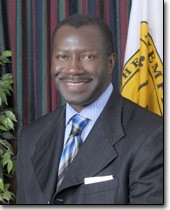Wanda Halbert was confused.
“This thing is so all over the place,” the Memphis City Councilmember said during a committee meeting last week. There was an exhausted frustration in her voice.

Courtesy Facebook group “I Have Been Negatively Affected by The City of Memphis Council Vote!!”
“I mean, we’re still talking about budget issues. Normally, we vote on the budget and we move on. We just heard (city Human Resources Director Quintin Robinson) say about a hundred times in two seconds that the council has already approved this, but, at the end of the day, here we are still talking about this. Why are we still talking about this?”
“This” is a slate of cuts made to the health insurance benefits for city employees and some retirees. The council made the changes when they passed the 2015 fiscal year budget back in June. Those changes will hit city employees and retirees right in their paychecks. And to say they were not pleased is something of an understatement.
Here are the biggest changes:
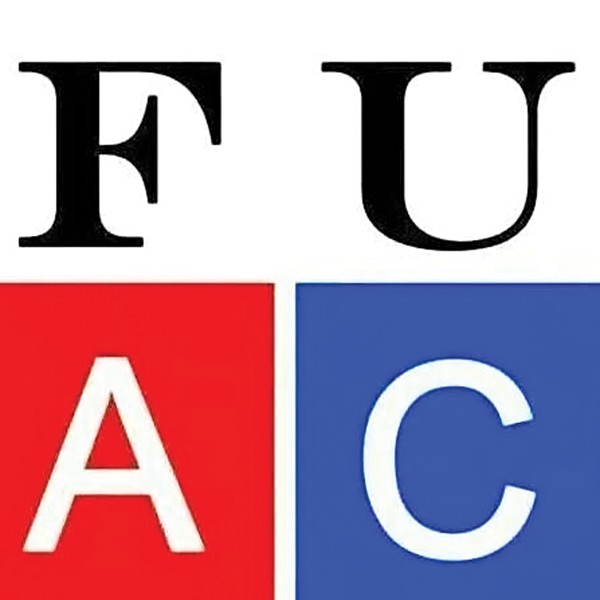
Courtesy Facebook group “I Have Been Negatively Affected by The City of Memphis Council Vote!!”
• Current employees and retirees will have to pay
24 percent more for their health insurance every month.
• Some retirees will lose a 70 percent (taxpayer-funded) subsidy to help pay their monthly health insurance costs.
• Employee spouses eligible for health insurance through their employer will be cut from the city plan.
• A surcharge for smokers increased from $50 per month per family to $120 per month per family.
• A $2 million safety net plan is now in place to help those in dire financial straits.
• Officials are working to open a no-cost health clinic for employees and retirees.
The backlash to the changes pushed the cuts back into the spotlight, where they’ve remained now, going on three months. That backlash has included public protests at Memphis City Hall and the Greater Memphis Chamber, and work actions — called Blue Flu and Red Rash — that saw hundreds of police officers and fire fighters call in sick around Independence Day.

Courtesy Facebook group “I Have Been Negatively Affected by The City of Memphis Council Vote!!”
Angry employees (or their spouses) have filled the council chambers every other week. Many have heckled city leaders anonymously from their seats, but some have taken to the public podium microphone to spill venom directly at council members. There’s also been plenty of wrath for Memphis Mayor A C Wharton and his administration in committee meetings, on Facebook, on bumper stickers, and in television interviews.
In addition to rallying, raving, and protesting, the unions that represent city employees and retirees were at work crafting their own health insurance plan. All of the protest noise was enough to keep the door cracked open on the benefits issue with the city council.
Through that crack, the Memphis Fire Fighters Association slipped in a proposed alternative health-care plan, one they hope will supplant the current plan and avoid some of the major cuts to employees. On August 21st, the union formally presented it to the city’s health-care oversight committee.
Here are the major components of the Memphis fire Fighters’ Association plan:
• A high-deductible plan that shifts much of the cost of insurance from the city to the employee (lower monthly premiums, higher out-of-pocket costs)
• Stops the 24 percent premium increases
• Stops the other cuts to retirees
• Allows spouses to stay on the plan
• Purports to save more than $24 million for the city
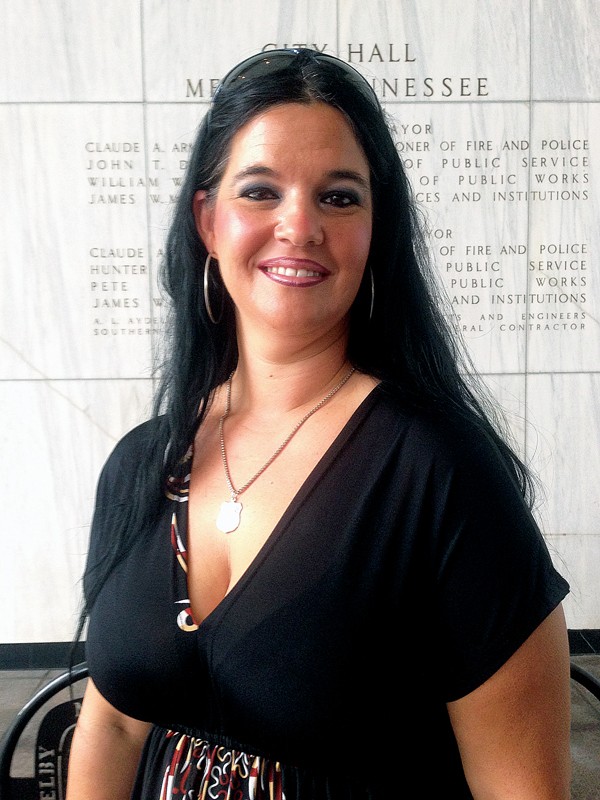
Fran Triplett
The fire fighters’ plan got traction with some city council members last week. They agreed to hear all of the details of the plan in a special meeting this week.
But council members also want to hear some final numbers before they make a decision. Number crunchers from Mercer, the city’s benefits consultant, and Cigna, the city’s insurance payor, disagreed on some major figures last week. A Mercer representative told council members the fire union’s plan would only save about $12 million in
12 months. A Cigna representative said the plan could save around $17 million.
But getting to either of those numbers could be tough. It would mean getting more than half of the city’s employees to voluntarily move to the high-deductible plan, and that’s no small feat when other options are available.
Either way, the savings are below those provided by the currently budgeted insurance plan, which is about $23 million.
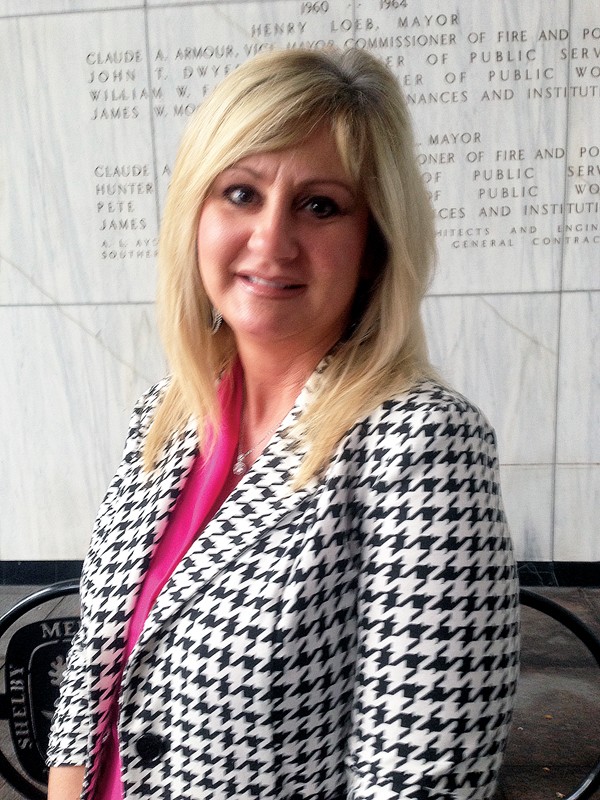
Donna Kirk
But if the experts could clear up these issues and prove that the savings are real, and if council members were so inclined, a new health insurance plan could be up for a vote on the council agenda next week.
“Obviously, we want to do as right as we fiscally can by our employees and the more ideas we have the better,” councilmember Shea Flinn said to reporters last Tuesday. “As of right now, the vote on [June] 17th is what stands. But in politics, there’s always another vote.”
But for some that’s not enough. Many in Memphis want to know the answer to Halbert’s question: Why? If a vote has been taken on the changes, why is this still an issue?
George Little, the city’s chief administrative officer and Wharton’s second-in-command, offered this plain-spoken explanation to Halbert:
“The fire fighters made a [health insurance] proposal after the budget process,” Little said. “It’s certainly a proposal that’s worthy of consideration, but since it was not presented in the run-up prior to the budget preparations, there was no way that we could have presented that or have had a discussion on it before the adoption of the budget. Since this has been proposed after the budget adoption and in response to the adoption of the budget, we’re at the table today having these discussions.”
Tough Times & Tough Choices
Making higher payments to the city’s pension fund was a cornerstone of Wharton’s budget and the council’s budget for the next 12 months. The cuts to the employee benefits this year will save $23 million in the next 12 months, and all of that money is supposed to go toward paying down the gap in the pension fund.
In fact, Wharton’s cut to benefits was deeper than
24 percent. He brought the council a 57-percent cut in benefits that would have saved even more money. But the figure was slashed nearly in half by council members looking for a compromise that got the budget passed back in June.
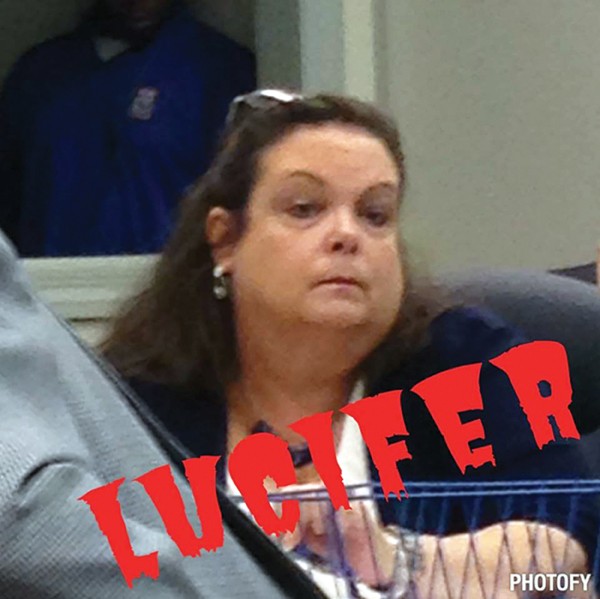
Brian Collins, the city’s finance director in Wharton’s administration, says the cuts were not “the path of least resistance.” Instead, he says, doing them was possibly the “toughest” and “most unpopular way to go.” But he adds that they were necessary. And he’s afraid that the need for such drastic measures has gotten lost in the recent noise down at city hall.
“We all kind of collectively woke up one day and realized the world had changed in very substantial ways,” Collins says. “What we woke up to was nearly $2 billion in collective unfunded liabilities, which is a massive amount of money for any city, but particularly for Memphis. We had to do something.
“And there was nothing less than a dramatic change that was going to make a difference when we were looking at liabilities that large. We had a huge underfunding problem with our pension plan and a huge underfunding problem with our medical plan.”
The Cuts Hit Home
So, what does the 24 percent premium increase look like on the ground?
City employees will see less in their paychecks. Active single employees will see their health-care rates go up $98 to $124 a month, depending on variables, resulting in new total monthly payments that will range from $506 to $642. Active employees with families will see rates go up $224 to $286 a month, resulting in monthly payments that will range from $1,155 to $1,476. The rates are the same or slightly higher for retirees.
But the cuts hit home in a lot of different ways. For some, it erodes their trust. They now see the city as an employer that broke a promise. For others, it disrespects the memory of a fallen loved one who was promised benefits for his family after his death. It makes others just plain mad at leaders who they see as having put the entire financial burden of the city’s budget woes on the backs of those in the trenches who are protecting and taking care of the city.
Fran Triplett’s husband has been a motorcycle cop for the Memphis Police Department for 21 years. She wears a small police badge charm on her necklace. Tattooed on her foot is a motorcycle wheel with wings. Even her email address identifies her as the wife of a motorcycle cop.
Her husband was injured in a crash while on the job more than four years ago, she said. He almost lost a leg and could have taken medical retirement, she said, but didn’t “because he loved his job.”

She doesn’t hesitate when told that health-care costs are going up for employees across the country:
“Everybody else isn’t stepping into a burning building, answering a call where a child is being molested or killed, or stepping in front of a bullet. So, I don’t really give a damn that everybody else’s [insurance] is going up.
“I challenge anybody that wants to look at us and say that premiums are going up, to strap on 80 pounds [of fire gear] in 110-degree heat, or put on a gun belt and a bullet-proof vest, or climb in a nasty sewer.
“You do all that for a 24-hour shift for $50,000 a year and then look me in the face and tell me, ‘Hey, everybody’s premiums are going up.’ Because they wouldn’t last one minute, one hour, one day.
“They took the job because they were basing it on what they were going to receive. Nobody — I don’t care who you are — is going to take a job making $50,000 and put their life on the line and put their spouse at risk and leave their children with nobody there at the end of the day.”
Donna Kirk’s husband, Lieutenant Trent Kirk, was killed on Father’s Day 2003. He and another Memphis fire fighter, Charles Zachary, died battling a blaze at a Family Dollar store in Frayser. The store’s manager later pleaded guilty to setting the fire.
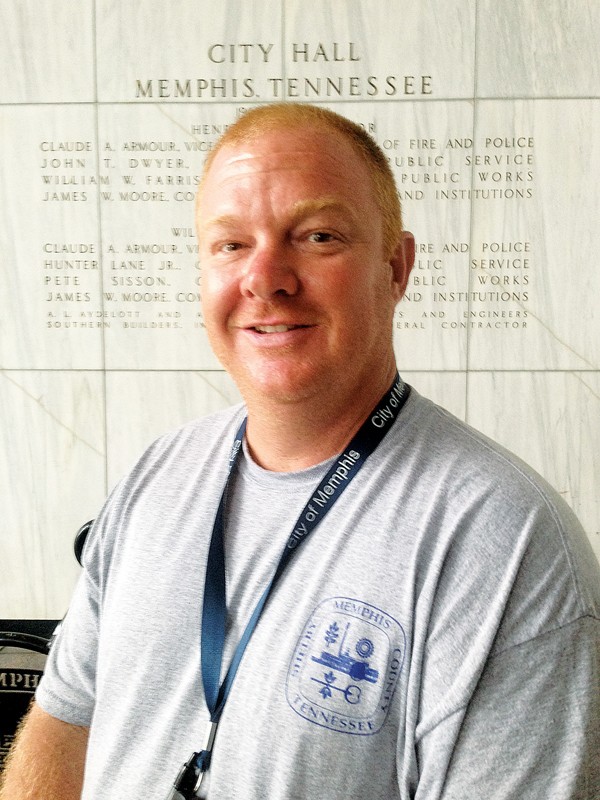
Dewayne Lufcy
“My husband and I were at our financial advisor’s office the Tuesday before he got killed. We laid everything out and looked at every one of our benefits. That’s how our life was managed. If we had known at that time (that he’d be killed), I would have gotten another life insurance policy.
“But this city promised us these benefits and he gave his life. Now, they’re trying to take everything. They may not be taking it right this moment from me, but a 24-percent increase over a period of time is my entire pension.
“Once they get this health care thing passed, they’re going to come after our pensions. So, this is something we were promised. Our husbands took these jobs based on that. You or I can’t go in after the fact and say, ‘Oh, well, I should have taken a bigger life insurance policy out on my husband.’ I was told I would get his pension until I died.”
Dewayne Lufcy works in the city’s sewer department and says it’s dangerous work in sometimes dangerous places.
He says he’s been trying to get financial information related to the health-care plan from the city but has not been successful. He’s fed up and says when the time limit runs out on his Freedom of Information Act request, he’s going to sue the city.
“It’s asinine. Here I am, a $50,000-a-year sewer worker, and I can look at a piece of paper and see wrongs in numbers, when you’ve got educated people up here on the fourth floor (of city hall) who can’t do it.

“I work on stuff they wouldn’t even dare think about getting in the same room with. We are subjected to 54 different communicable diseases every day of our life. I’m on call 24/7. I go to South Memphis and I’m not allowed to tote a weapon by city ordinance. I go into back alleys in South Memphis, subdivisions where the police don’t like to go. I can’t carry a gun. I can’t wear a bulletproof vest. That’s me.”
Promises and the Law
Were promises on health-care benefits broken? Does any city employee have the promise of health-care benefits written into their contract?
“No, as a matter of fact, it’s not anywhere,” Collins says. “In fact, the same Tennessee Supreme Court that tells us that the pension is a commitment that we have to keep, is the same court that has said retiree health care is not, in fact, in that same category.
“It is a plan that we offer. But it is only a commitment we offer right now. It is always subject to change and over the years, the health-care plan changes. This is another change.”
Memphis police officers and fire fighters do get incentives for having dangerous jobs: They get college incentive pay, longevity pay, holiday paychecks, and they’re able to retire about 10 years sooner than general city employees, the city’s HR director, Quintin Robinson, said.
Turning the Battleship
Robinson and the city’s human resources team began implementing the changes to the health-care plan as soon as the council passed it back in June.
Since then, they’ve had 15 town hall meetings with employees and retirees to explain the changes and printed thousands of plan-specific enrollment booklets set to go out “any day,” he said.
Open enrollment begins in October. Plan changes take effect at the beginning of next year. Enrollment in the federal health insurance exchange begins in November as does enrollment in some Medicare plans.
“To the extent that we’re talking about making some changes, we will not meet the [January 1st] implementation date,” Robinson told councilmembers last week. “I want to make sure we’re all aware of that and that for any further changes we make that are pushed out past that date, there are going to be budget impacts.”
But that’s not reason enough to stop the benefits discussion for some city council members. Janis Fullilove has repeated many times that making the cuts is “playing with people’s lives.” Harold Collins (who was absent for the budget vote) made it plain in a meeting last week that he, too, thinks the issue needs more attention.
“We all recognize that we already made a decision,” Collins said. “Let me make this very clear to us. We owe it to the 650,000 [Memphis] citizens, and to the employees who work for us that everything can change — down to the last minute if we have to — to ensure that we come up with a plan that everybody can be satisfied with, regardless of what we did on June 17th or will do on January 1, 2015.”
Finance Director Collins has no problem with the council listening to new suggestions.
“But we’re not hearing anything that solves the problems that we face,” Collins says. “It is my belief that this process that they are going through will not be able to change the fundamental facts and issues that we face. So, I don’t expect a majority of council members to come back and reverse itself, because to do so would put us back, not where we were, but in a worse place than where we were. A proponent of [a new plan that passed] would then have to turn around and say, ‘Okay, now what do we do?'”
 Justin Fox Burks
Justin Fox Burks 
 Dreamstime.com
Dreamstime.com 